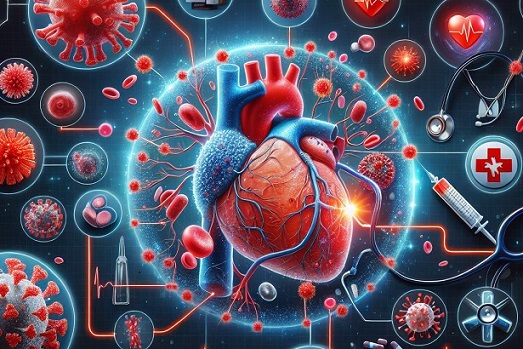Nikhil Prasad Fact checked by:Thailand Medical News Team Oct 30, 2025 3 months, 2 weeks, 23 hours, 57 minutes ago
Medical News: Shared Molecular Triggers in Two Major Diseases
Scientists from the Weifang Second People’s Hospital, Jinhua People’s Hospital, Fuwai Hospital, and the Chinese Academy of Medical Sciences have uncovered two key genes that appear to drive both heart failure and COVID-19. Using powerful bioinformatics tools, the research team found that the genes RPS27A and PPP2R1A play crucial roles in how inflammation and immune system imbalances damage the body. This
Medical News report reveals how these shared genetic signatures could explain why COVID-19 worsens heart conditions or even causes new cardiac complications in infected individuals.
 Hidden Genetic Link Between Heart Failure and COVID-19 Discovered
How the Study Was Conducted
Hidden Genetic Link Between Heart Failure and COVID-19 Discovered
How the Study Was Conducted
The researchers analyzed two large sets of genetic data—one from the heart tissue of patients with heart failure and another from lung tissue of COVID-19 victims. They identified over 500 genes showing similar activity changes in both diseases. These genes were then examined using advanced analytical techniques to identify which ones acted as “hubs” controlling multiple biological pathways. The strongest candidates, RPS27A and PPP2R1A, were found to be significantly more active in both groups, suggesting they may regulate inflammation and tissue damage seen in the heart and lungs.
Genes Controlling Cellular Stress and Inflammation
RPS27A is responsible for producing a ribosomal protein essential for protein synthesis and cell repair. When overly active, it can trigger abnormal protein production and disrupt cell balance, a hallmark of heart failure and viral infection. Meanwhile, PPP2R1A helps regulate a cellular enzyme that controls inflammation and stress responses. The study showed that excessive activation of PPP2R1A may alter immune cell activity, promoting harmful inflammation and damaging tissues during COVID-19 and heart failure episodes.
Immune System Clues in Both Diseases
By analyzing immune activity in affected tissues, the team found elevated macrophages—cells that drive inflammation—in both heart failure and COVID-19 samples. This supports the idea that both illnesses share immune dysregulation as a core mechanism. The researchers also discovered that small molecules known as microRNAs, including miR-497-5p and miR-15b-5p, could regulate PPP2R1A.These molecules are already linked to cardiac stress and viral defense, adding another layer of connection between the two diseases.
Potential for Cross-Disease Treatments
The findings suggest that targeting these shared genes might lead to therapies that can treat both heart failure and complications of COVID-19. Drugs that modulate RPS27A or PPP2R1A activity could help restore immune balance and reduce tissue damage. However, the researchers emphasized that more laboratory experiments and clinical testing are needed to confirm these possibilities.
A Step Toward Understanding COVID-Related Hea
rt Damage
By revealing genetic overlaps between heart failure and COVID-19, this study helps explain why patients with heart disease are at higher risk of severe outcomes from SARS-CoV-2 infection. It also highlights how viral infections can mimic or accelerate cardiovascular disease. These discoveries mark a significant advancement in uncovering the hidden biological ties between viral infection and chronic heart disorders.
The study findings were published in the peer reviewed Journal of Cardiothoracic Surgery.
https://cardiothoracicsurgery.biomedcentral.com/articles/10.1186/s13019-025-03634-0
For the latest COVID-19 News, keep on logging to Thailand
Medical News.
Read Also:
https://www.thailandmedical.news/articles/cardiology
https://www.thailandmedical.news/articles/coronavirus
